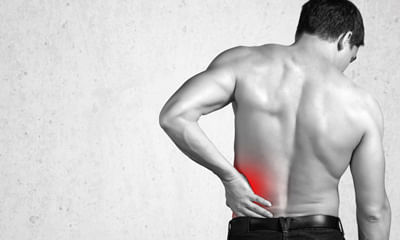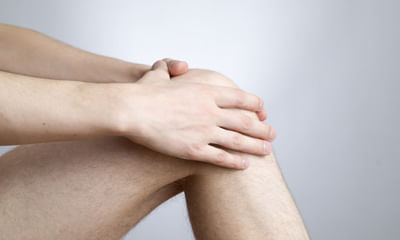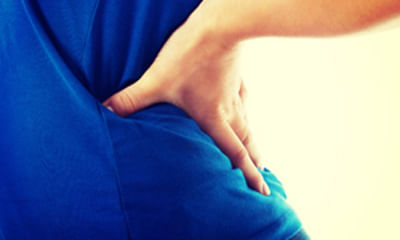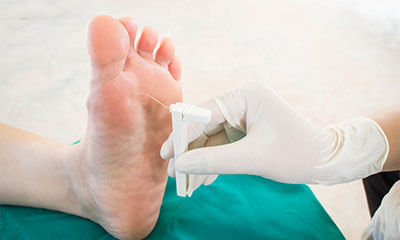Gabapentin Neuropathic Pain
I have pain in lower back, butt, legs and feet. And also burning sensation in the legs and feet. And I am not able to wa ...
Ask Free Question
If you are suffering from burning pain or tingling sensation in hands or feet; sharp shooting pain in legs; numbness in hands or feet, then you might be suffering from neuropathic pain. What is a neuropathic pain? Neuropathic pain is a special type of pain which occurs when there is damage to nerve fibres, which produces tingling or burning type of pain. It is of two types: 1. Peripheral neuropathic pain: it occurs when there is an injury to peripheral nerve fibres (a-delta or c-fibers) which carries pain sensation to the brain (thalamus) for interpretation. 2. Central neuropathic pain: it occurs due to sensitization of central pain interpreting mechanisms (thalamus) to falsely feel pain when peripheral nerve fibres are no longer sending pain impulses to them. Worldwide-estimates of the prevalence of neuropathic pain is 7% i.e. 7 persons out of 100 people are suffering from different types of neuropathic pain. Symptoms: •tingling sensation or feeling of ants crawling under skin •burning sensation •sharp shooting pain or electric current-like sensation •stabbing pain •dull pain with numbness or heaviness reasons for neuropathic pain: •diabetes mellitus: most common cause worldwide due to uncontrolled blood sugar levels, causing damage to nerve fibres. •alcohol consumption/cigarette smoking: damage to nerve fibres or damage to blood vessels supplying nerve fibres. Burning pain in feet •neck pain/low back pain/glutei pain •vit. B12 deficiency •chemotherapy for cancer patients •post-herpes virus infection •post-spine surgery •post-amputation •diseases like spinal cord injury, multiple sclerosis, hiv, lead toxicity, etc. Special neuropathies: 1. Carpal tunnel syndrome: tingling, burning sensation in hand which occurs due to compression of median nerve in the wrist area. It occurs in women especially due to pregnancy, hypothyroidism, diabetes, etc. And in men due to improper position of the wrist during working on computers. 2. Cervical radiculopathy: pain in neck and shoulder region (which increases with neck movements), along with sharpshooting pain radiating from neck to hand occurs in cases of cervical radiculopathy. This is due to compression of the cervical nerve root by disc prolapse, facet subluxation, muscle spasm, trauma, etc. 3. Lumbar radiculopathy: pain in lower back or glutei region with sharp shooting pain radiating from hip to leg/foot region, occurs in cases of lumbar radiculopathy or sciatica. This is due to compression of lumbar nerve root or sciatic nerve by disc prolapse, facet joint, trauma, hypertrophied ligamentumflavum, piriformis syndrome, etc. 4. Meralgiaparesthetica: tingling or burning sensation in front of the thigh, occurs due to compression of lateral cutaneous nerve of thigh, near waist region. Usual causes are tight or constrictive clothing at waist region, prolonged sitting, protuberant abdomen, etc. Prevention of neuropathy: 1. Avoid alcohol consumption and cigarette smoking. 2. Maintain ideal body weight/bmi (body mass index) 3. Lifestyle changes: daily exercises (>30 minutes per day) or brisk walking or swimming; avoid prolonged sitting or standing (>30 minutes). 4. Food/diet should have following components: •green vegetables e.g. Spinach, fenugreek leaves (methi), radish, etc •coloured vegetables e.g. Tomato, carrot, capsicum (green/red), ladies-finger (bhindi) •milk products e.g. Milk, buttermilk, curd, cheese (paneer) •protein-rich foods e.g. Fish, egg, chicken, pulses (daal) •fibre-rich foods e.g. Bran, oats, brown-rice •fruits e.g. Apple, orange, guava, papaya, pomegranate, berries 5. Blood sugar control (in diabetics) 6. Care of feet: •regular inspection of feet (with mirror) •comfortable, well-fitted shoes •regular consultation with a podiatrist •treatment of wounds, foot deformities 7. Adequate sleep 8. Warm water bath (increases blood flow to the affected area) treatment: •consult pain medicine specialist. •neuropathic painkillers e.g. Amitriptyline, pregabalin, gabapentin, capsaicin, duloxetine, etc. •vit. B12 supplements, anti-oxidants, multi-vitamins. •transcutaneous electrical nerve stimulation (tens) •acupuncture •relaxation and yoga •neural prolotherapy.
I'm 24 years male. I'm having pain in foot for around an year but have ignored but it was still there. It is kind of bur ...
Ask Free Question
Burning pain or tingling sensation in hands or feet if you are suffering from burning pain or tingling sensation in hands or feet; sharp shooting pain in legs; numbness in hands or feet, then you might be suffering from neuropathic pain what is a neuropathic pain? Neuropathic pain is a special type of pain which occurs when there is damage to nerve fibres, which produces tingling or burning type of pain. It is of two types: 1. Peripheral neuropathic pain: it occurs when there is an injury to peripheral nerve fibres (a-delta or c-fibers) which carries pain sensation to the brain (thalamus) for interpretation. 2. Central neuropathic pain: it occurs due to sensitization of central pain interpreting mechanisms (thalamus) to falsely feel pain when peripheral nerve fibres are no longer sending pain impulses to them. Worldwide-estimates of the prevalence of neuropathic pain is 7% i.e. 7 persons out of 100 people are suffering from different types of neuropathic pain. Symptoms: •tingling sensation or feeling of ants crawling under skin •burning sensation •sharp shooting pain or electric current-like sensation •stabbing pain •dull pain with numbness or heaviness reasons for neuropathic pain: •diabetes mellitus: most common cause worldwide due to uncontrolled blood sugar levels, causing damage to nerve fibres. •alcohol consumption/cigarette smoking: damage to nerve fibres or damage to blood vessels supplying nerve fibres. Burning pain in feet •neck pain/low back pain/glutei pain •vit. B12 deficiency •chemotherapy for cancer patients •post-herpes virus infection •post-spine surgery •post-amputation •diseases like spinal cord injury, multiple sclerosis, hiv, lead toxicity, etc. Special neuropathies: 1. Carpal tunnel syndrome: tingling, burning sensation in hand which occurs due to compression of median nerve in the wrist area. It occurs in women especially due to pregnancy, hypothyroidism, diabetes, etc. And in men due to improper position of the wrist during working on computers. 2. Cervical radiculopathy: pain in neck and shoulder region (which increases with neck movements), along with sharpshooting pain radiating from neck to hand occurs in cases of cervical radiculopathy. This is due to compression of the cervical nerve root by disc prolapse, facet subluxation, muscle spasm, trauma, etc. 3. Lumbar radiculopathy: pain in lower back or glutei region with sharp shooting pain radiating from hip to leg/foot region, occurs in cases of lumbar radiculopathy or sciatica. This is due to compression of lumbar nerve root or sciatic nerve by disc prolapse, facet joint, trauma, hypertrophied ligamentumflavum, piriformis syndrome, etc. 4. Meralgiaparesthetica: tingling or burning sensation in front of the thigh, occurs due to compression of lateral cutaneous nerve of thigh, near waist region. Usual causes are tight or constrictive clothing at waist region, prolonged sitting, protuberant abdomen, etc. Prevention of neuropathy: 1. Avoid alcohol consumption and cigarette smoking. 2. Maintain ideal body weight/bmi (body mass index) 3. Lifestyle changes: daily exercises (>30 minutes per day) or brisk walking or swimming; avoid prolonged sitting or standing (>30 minutes). 4. Food/diet should have following components: •green vegetables e.g. Spinach, fenugreek leaves (methi), radish, etc •coloured vegetables e.g. Tomato, carrot, capsicum (green/red), ladies-finger (bhindi) •milk products e.g. Milk, buttermilk, curd, cheese (paneer) •protein-rich foods e.g. Fish, egg, chicken, pulses (daal) •fibre-rich foods e.g. Bran, oats, brown-rice •fruits e.g. Apple, orange, guava, papaya, pomegranate, berries 5. Blood sugar control (in diabetics) 6. Care of feet: •regular inspection of feet (with mirror) •comfortable, well-fitted shoes •regular consultation with a podiatrist •treatment of wounds, foot deformities 7. Adequate sleep 8. Warm water bath (increases blood flow to the affected area) treatment: •consult pain medicine specialist. •neuropathic painkillers e.g. Amitriptyline, pregabalin, gabapentin, capsaicin, duloxetine, etc. •vit. B12 supplements, anti-oxidants, multi-vitamins. •transcutaneous electrical nerve stimulation (tens) •acupuncture •relaxation and yoga •neural prolotherapy.
I'm 24 years male. I'm having pain in foot for around an year but have ignored but it was still there. It is kind of bur ...
Ask Free Question
Burning pain or tingling sensation in hands or feet if you are suffering from burning pain or tingling sensation in hands or feet; sharp shooting pain in legs; numbness in hands or feet, then you might be suffering from neuropathic pain what is a neuropathic pain? Neuropathic pain is a special type of pain which occurs when there is damage to nerve fibres, which produces tingling or burning type of pain. It is of two types: 1. Peripheral neuropathic pain: it occurs when there is an injury to peripheral nerve fibres (a-delta or c-fibers) which carries pain sensation to the brain (thalamus) for interpretation. 2. Central neuropathic pain: it occurs due to sensitization of central pain interpreting mechanisms (thalamus) to falsely feel pain when peripheral nerve fibres are no longer sending pain impulses to them. Worldwide-estimates of the prevalence of neuropathic pain is 7% i.e. 7 persons out of 100 people are suffering from different types of neuropathic pain. Symptoms: •tingling sensation or feeling of ants crawling under skin •burning sensation •sharp shooting pain or electric current-like sensation •stabbing pain •dull pain with numbness or heaviness reasons for neuropathic pain: •diabetes mellitus: most common cause worldwide due to uncontrolled blood sugar levels, causing damage to nerve fibres. •alcohol consumption/cigarette smoking: damage to nerve fibres or damage to blood vessels supplying nerve fibres. Burning pain in feet •neck pain/low back pain/glutei pain •vit. B12 deficiency •chemotherapy for cancer patients •post-herpes virus infection •post-spine surgery •post-amputation •diseases like spinal cord injury, multiple sclerosis, hiv, lead toxicity, etc. Special neuropathies: 1. Carpal tunnel syndrome: tingling, burning sensation in hand which occurs due to compression of median nerve in the wrist area. It occurs in women especially due to pregnancy, hypothyroidism, diabetes, etc. And in men due to improper position of the wrist during working on computers. 2. Cervical radiculopathy: pain in neck and shoulder region (which increases with neck movements), along with sharpshooting pain radiating from neck to hand occurs in cases of cervical radiculopathy. This is due to compression of the cervical nerve root by disc prolapse, facet subluxation, muscle spasm, trauma, etc. 3. Lumbar radiculopathy: pain in lower back or glutei region with sharp shooting pain radiating from hip to leg/foot region, occurs in cases of lumbar radiculopathy or sciatica. This is due to compression of lumbar nerve root or sciatic nerve by disc prolapse, facet joint, trauma, hypertrophied ligamentumflavum, piriformis syndrome, etc. 4. Meralgiaparesthetica: tingling or burning sensation in front of the thigh, occurs due to compression of lateral cutaneous nerve of thigh, near waist region. Usual causes are tight or constrictive clothing at waist region, prolonged sitting, protuberant abdomen, etc. Prevention of neuropathy: 1. Avoid alcohol consumption and cigarette smoking. 2. Maintain ideal body weight/bmi (body mass index) 3. Lifestyle changes: daily exercises (>30 minutes per day) or brisk walking or swimming; avoid prolonged sitting or standing (>30 minutes). 4. Food/diet should have following components: •green vegetables e.g. Spinach, fenugreek leaves (methi), radish, etc •coloured vegetables e.g. Tomato, carrot, capsicum (green/red), ladies-finger (bhindi) •milk products e.g. Milk, buttermilk, curd, cheese (paneer) •protein-rich foods e.g. Fish, egg, chicken, pulses (daal) •fibre-rich foods e.g. Bran, oats, brown-rice •fruits e.g. Apple, orange, guava, papaya, pomegranate, berries 5. Blood sugar control (in diabetics) 6. Care of feet: •regular inspection of feet (with mirror) •comfortable, well-fitted shoes •regular consultation with a podiatrist •treatment of wounds, foot deformities 7. Adequate sleep 8. Warm water bath (increases blood flow to the affected area) treatment: •consult pain medicine specialist. •neuropathic painkillers e.g. Amitriptyline, pregabalin, gabapentin, capsaicin, duloxetine, etc. •vit. B12 supplements, anti-oxidants, multi-vitamins. •transcutaneous electrical nerve stimulation (tens) •acupuncture •relaxation and yoga •neural prolotherapy.
Diabetic peripheral neuropathic burning feet .how to cure it .although talking medicine 1200 mg gabapentin nt 20 mg but ...
Ask Free Question
Hello, thanks for the query. I have seen the details mentioned. The symptoms of peripheral neuropathy like burning pain or irritation, those can be effectively controlled by using certain medications like gabapentine, pragabalin & methylcobalamineetc. But it is difficult to "cure" those. The reason is those are part of the long term complications of diabetes mellitus. Neuropathy tends to be more severe and repetitive if blood glucose is not in proper control. I am sure you are aware at your age ideally fbg should be just around 100 mg & pp glucose should be 150 170 mg, plus hba1c% has to be < 7%. Since there is no information on those, it is difficult to know how good is your blood glucose control. The medications being used are good enough, but strict glucose control is also more important. Thanks.
Hi. Gm just wanted to know about 2nd opinion I had been to a neurologist for check up, last month was diagnosed with dia ...
Ask Free Question
Hello, thanks for the query. Usually in a person with long standing diabetes mellitus, symptoms of periphera; neiropathy develop. The condition is seen in most of the diabetes patients, particularly it is worse in those who had a badly controlled blood glucose levels and high hba1c%. If diabetes is controlled well right from beginning then the severity is quite less. However, if the control is persistently bad then severity of symptoms more. Therefore, apart from achieving a very strict glucose control, various medications that are mentioned need to be taken. Since you have both sensory and motor effects it is a difficult situation. You will have to continue the medications and hope it will improve. Thanks.
My mother ambika nair is diabetic for over 35 years. Her sugar levels are in control. The recent test was 107 fasting an ...
Ask Free Question
Sorry to know that your mother is in pain, burning sensation could be due to diabetes ,rapid correction of blood sugars or kidney related issues. Please check her body weight, blood pressure and serum creatinine. Muscle pain could be a part of neuropathy and if there is stiffness relaxants like baclofen or tizanidine could help. Non opioid pain medication like tramadol which is safe in diabetes could be added to paracetamol. Burning sensation may respond to medications like gabapentin, carbazepinr, amitriptyline etc. Please consult a doctor who takes a good history and physical exam and treat accordingly. Thanks.
My father is diabetic and has neuropathy issue and uses to stick to walk outside home, so left leg has less sensation. I ...
Ask Free Question
Prevention of neuropathy: 1. Avoid alcohol consumption and cigarette smoking. 2. Maintain ideal body weight/bmi (body mass index) 3. Lifestyle changes: daily exercises (>30 minutes per day) or brisk walking or swimming; avoid prolonged sitting or standing (>30 minutes). 4. Food/diet should have following components: •green vegetables e.g. Spinach, fenugreek leaves (methi), radish, etc •coloured vegetables e.g. Tomato, carrot, capsicum (green/red), ladies-finger (bhindi) •milk products e.g. Milk, buttermilk, curd, cheese (paneer) •protein-rich foods e.g. Fish, egg, chicken, pulses (daal) •fibre-rich foods e.g. Bran, oats, brown-rice •fruits e.g. Apple, orange, guava, papaya, pomegranate, berries 5. Blood sugar control (in diabetics) 6. Care of feet: •regular inspection of feet (with mirror) •comfortable, well-fitted shoes •regular consultation with a podiatrist •treatment of wounds, foot deformities 7. Adequate sleep 8. Warm water bath (increases blood flow to the affected area) treatment: •consult pain medicine specialist. •neuropathic painkillers e.g. Amitriptyline, pregabalin, gabapentin, capsaicin, duloxetine, etc. •vit. B12 supplements, anti-oxidants, multi-vitamins. •transcutaneous electrical nerve stimulation (tens) •acupuncture •relaxation and yoga •neural prolotherapy a burning sensation in your feet may be caused by nerve damage in the legs, also called neuropathy. Although many medical conditions can cause burning feet, diabetesis the most common. Most burning feet treatments focus on preventing further nerve damage and reducing pain. Causes of burning feet most often, neuropathy is the cause of burning feet. Damaged nerve fibers are more likely to become overactive and misfire. The damaged nerves send pain signals to the brain even though there is no wound. In most people with neuropathy, the leg nerves become damaged first. These people often have tingling and numbness in the feet as well. Many people complain that their feet are overly sensitive to touch (hyperesthesia) and can have varying degrees of burning pain. It can range from mild to disabling. Diabetes and alcohol abuse are by far the most common causes of neuropathy in the legs. Many other conditions can cause neuropathy or a burning sensation in the feet: besides neuropathy, infections and inflammation of the feet can also cause a burning sensation. The most common of these is athlete's foot, an infection of the skin caused by fungus. Peripheral artery disease (pad) also commonly causes burning feet. The poor circulation of blood to the feet may frequently cause pain, tingling, and burning feet, especially while walking. •chronic kidney disease (uremia) •small fiber neuropathy •vitamin deficiency (vitamin b12, folate, and occasionally vitamin b6) •alcohol abuse •low thyroid hormone levels (hypothyroidism) •lyme disease •hiv/aids •amyloid polyneuropathy •drug side effects, including chemotherapy drugs, vitamin b6 overdose, hiv medicines, amiodarone, isoniazid, metformin, and others •erythromelalgia •heavy metal poisoning (lead, mercury, arsenic) •vasculitis (inflammation of bloodvessels) •sarcoidosis •guillain-barre syndrome (gbs) •chronic inflammatory demyelinating polyneuropathy (cidp) •always use the footwear of proper fitting and which is comfortable. •always use socks. Never use shoes without socks. •after a long day work, it is advisable to stretch and also to ice your feet. •provide rest to your feet as much as you can. •avoid the use of alcohol or any narcotic items. •acupuncture or magnetic therapy shall be done whenever possible to keep the nerves active. •follow all the instructions as given by the doctor. Radiculopathy, also commonly referred to as pinched nerve, refers to a set of conditions in which one or more nerves are affected and do not work properly (a neuropathy). This can result in pain (radicular pain), weakness, numbness, or difficulty controlling specific muscles.[1] in a radiculopathy, the problem occurs at or near the root of the nerve, shortly after its exit from the spinal cord. However, the pain or other symptoms often radiate to the part of the body served by that nerve. For example, a nerve root impingement in the neck can produce pain and weakness in the forearm. Likewise, an impingement in the lower back or lumbar-sacral spine can be manifested with symptoms in the foot. The radicular pain that results from a radiculopathy should not be confused with referred pain, which is different both in mechanism and clinical features. This should be due to the sciatic nerve compression in the right side probably close to your l5 vertebrae. It can also be due to the strain on the left leg, try wearing mcr chappals which would help you to get relieved from pain. Juice helps you to get cleansed with toxins. Ginger in general is good for joint pain and honey / black pepper helps you to get rid out of toxins quickly increase rom- free active exercises of lumbar spine. Pelvic tilting forward, backward in crook lying, quadriped, sitting and standing. Mobilization- restoration of intersegmental mobility by accessory pressure enables the patient to regain full functional painfree movement.
Hai. I'm divya, 28 yrs. I was facing constipation for many years. So due to that I got nerve pain in my anal. Few months ...
Ask Free Question
Your physician has prescribed 100 mg to see if you could tolerate the medication well. Gabapentin for neuropathic pain is usually started at a low dosage initially to make sure the patient tolerates it without any side effects like drowsiness, dizziness etc. Then the dose would be gradually increased to reach adequate pain management. Please consult your physician for advice regarding the increase in dosage.
One of my colleague is suffering from severe foot pain while sleeping. He is diabetic. ...
Ask Free Question
If you are suffering from burning pain or tingling sensation in hands or feet; sharp shooting pain in legs; numbness in hands or feet, then you might be suffering from neuropathic pain. Neuropathic pain is a special type of pain which occurs when there is damage to nerve fibres, which produces tingling or burning type of pain. It is of two types: 1. Peripheral neuropathic pain: it occurs when there is an injury to peripheral nerve fibres (a-delta or c-fibers) which carries pain sensation to the brain (thalamus) for interpretation. 2. Central neuropathic pain: it occurs due to sensitization of central pain interpreting mechanisms (thalamus) to falsely feel pain when peripheral nerve fibres are no longer sending pain impulses to them. Prevention of neuropathy: 1. Avoid alcohol consumption and cigarette smoking. 2. Maintain ideal body weight/bmi (body mass index) 3. Lifestyle changes: daily exercises (>30 minutes per day) or brisk walking or swimming; avoid prolonged sitting or standing (>30 minutes). 4. Food/diet should have following components: •green vegetables e.g. Spinach, fenugreek leaves (methi), radish, etc •coloured vegetables e.g. Tomato, carrot, capsicum (green/red), ladies-finger (bhindi) •milk products e.g. Milk, buttermilk, curd, cheese (paneer) •protein-rich foods e.g. Fish, egg, chicken, pulses (daal) •fibre-rich foods e.g. Bran, oats, brown-rice •fruits e.g. Apple, orange, guava, papaya, pomegranate, berries 5. Blood sugar control (in diabetics) 6. Care of feet: •regular inspection of feet (with mirror) •comfortable, well-fitted shoes •regular consultation with a podiatrist •treatment of wounds, foot deformities 7. Adequate sleep 8. Warm water bath (increases blood flow to the affected area) treatment: •consult pain medicine specialist. •neuropathic painkillers e.g. Amitriptyline, pregabalin, gabapentin, capsaicin, duloxetine, etc. •vit. B12 supplements, anti-oxidants, multi-vitamins. •transcutaneous electrical nerve stimulation (tens) •acupuncture •relaxation and yoga •neural prolotherapy.
What is best medicine for diabetic foot neuropathy. Gabapin is good. Nerves to be opened. ...
Ask Free Question
Hi, please send your diabetic reports for better advised. Gabapentin is good medicines for neuropathic pain.









